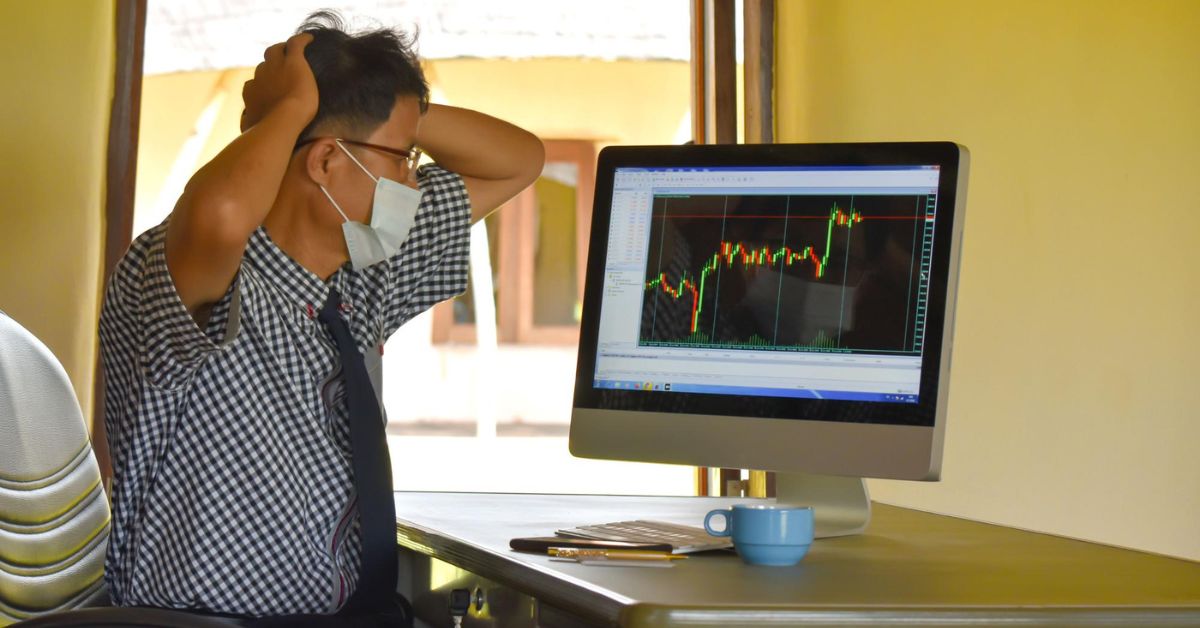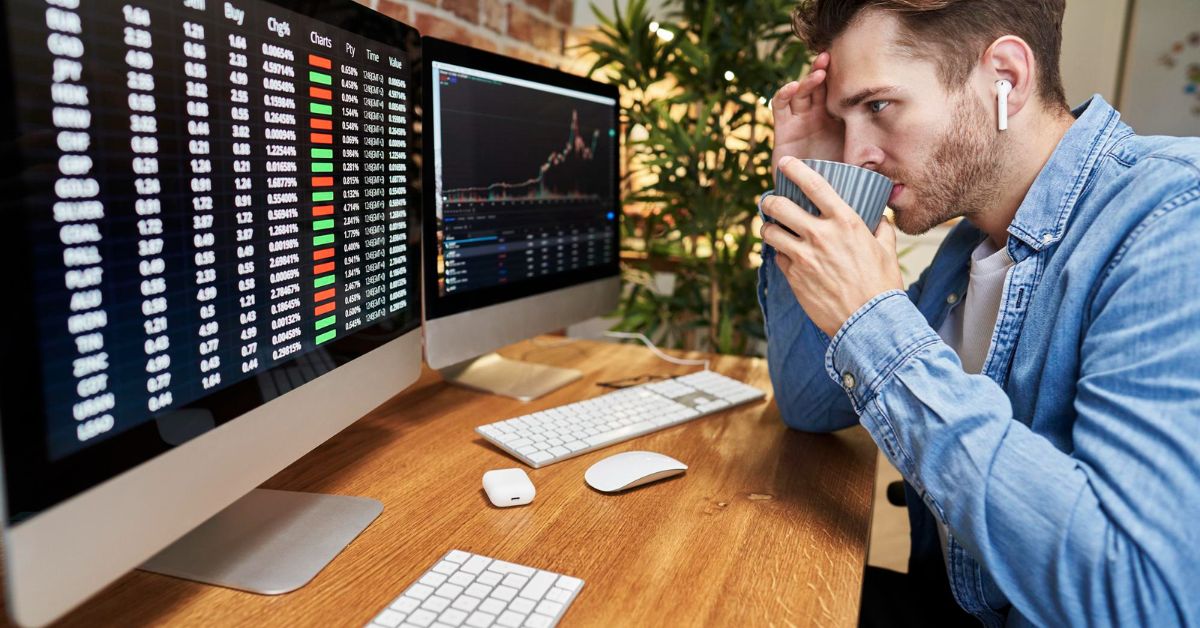Trading can be a thrilling and profitable venture, but it can also be incredibly stressful. The constant market fluctuations and high stakes can take a toll on even the most experienced traders. Both your mental and physical health depend on knowing when to step back.
Taking a break doesn’t mean you’re giving up. It means you’re investing in your long-term success. In this article, we’ll explore the signs that indicate a need for a break, the benefits of stepping away, and how to plan your return effectively.
If you’re feeling overwhelmed, it might be time to consider a break. Prime XBT offers reliable resources and tools to help you stay informed and make smart trading decisions. So, join PrimeXBT today! Use promo code PRIMEOTT to receive a +7% bonus on your deposit.
Should I Take a Break from Trading?

Stepping back from trading can be a powerful tool for maintaining long-term success. Taking breaks allows traders to recharge, refocus, and avoid costly mistakes driven by fatigue or stress. Here are a few reasons why it’s essential:
Mental and Emotional Fatigue
Trading can be mentally exhausting, especially with high-stakes decisions and market volatility. Over time, this pressure builds up and can cloud your judgment. Taking a break helps you clear your mind, regain emotional balance, and return to trading with a fresh perspective, which can lead to better decision-making.
Avoiding Overtrading and Burnout
Overtrading occurs when traders engage in too many trades, often driven by a need for constant activity. This behavior can lead to poor choices, as traders may ignore their strategies in favor of chasing quick gains. Regular breaks reduce the urge to overtrade, helping you maintain objectivity and focus on quality over quantity in your trades.
Dealing with Losing Streaks
Experiencing a losing streak can be challenging, especially when it begins to impact confidence. When losses start to affect your mindset, it’s easy to make impulsive decisions out of frustration or fear. Taking a step back gives you a chance to assess your strategies and make necessary adjustments without the emotional weight of recent losses.
Signs You May Need a Break
Breaks from trading can boost your long-term performance and protect your mental health. Recognizing signs of burnout or fatigue early can prevent costly mistakes and help you regain your focus. Here are some key indicators to look for:
Constant Emotional Reactions to Market Fluctuations
If you find yourself reacting emotionally to every market movement, this could be a sign that stress is affecting your judgment. Being overly reactive—feeling extreme joy over small gains or deep disappointment over minor losses—can indicate that you’re too emotionally invested. Trading effectively requires a calm mindset, and taking a break can help reset your emotional state.
Reduced Focus and Clarity
A clear and focused mind is essential for analyzing market trends and making sound decisions. If you’re struggling to interpret data or if your attention wanders frequently, this could mean you’re experiencing cognitive fatigue. A break allows you to rest and return with a sharper focus, which is crucial for accurate market analysis.
Increased Error Rate
Frequent mistakes, like entering incorrect trade amounts, missing entry or exit signals, or deviating from your strategy, are red flags. These errors can stem from exhaustion or mental strain. By taking a break, you give yourself the space to recalibrate, reducing the likelihood of costly mistakes due to mental fatigue.
These signs serve as reminders that even experienced traders need rest to perform optimally. Recognizing when you need to take a break is as valuable as knowing when to trade.
Benefits of Taking a Break from Trading

Trading requires intense focus and emotional resilience, and taking time off can provide essential mental and physical relief. Here are some key advantages to taking breaks in your trading routine:
Opportunity for Self-Reflection
Stepping away from active trading offers valuable time for self-reflection. During a break, you can review past trades, evaluate what worked well, and identify mistakes. Reflection can help improve future trading strategies and build confidence, allowing for a more mindful approach when you return.
Reduced Stress and Improved Mental Health
Constant trading can lead to heightened stress levels, which may affect your judgment. Taking breaks gives your mind time to unwind and recharge. A refreshed mind is better equipped to handle the pressures of trading and make clearer, more objective decisions.
Strengthening Long-Term Performance
Taking time off can actually enhance your performance in the long run. A well-rested trader is less likely to make impulsive, risky trades driven by fatigue or emotional exhaustion. After a break, you can return with a sharper focus, leading to smarter, more strategic decision-making.
Gaining New Perspectives
Time away from trading allows you to see the market from a fresh perspective. Reading, learning, or simply observing market trends without the pressure of active trading can open up new insights and refine your approach. With a clearer, broader view of the market, you may spot opportunities or trends that you might have missed before.
Preventing Burnout and Preserving Passion
Burnout is a common problem for traders due to high-stress conditions. Taking periodic breaks helps preserve your enthusiasm for trading and prevents feelings of frustration. A renewed passion can lead to better engagement and decision-making when you return to trading.
Improving Risk Management Skills
Breaks give you a chance to reassess your risk management strategies without the distractions of daily trading. You can manage risk better if you reflect on your risk tolerance and learn about advanced risk management tools.
Taking breaks is essential for staying balanced and maintaining discipline in the fast-paced world of trading.
How Long Should a Trading Break Be?

Taking the right amount of time for a trading break depends on individual needs, setbacks experienced, and trading style. Knowing when to take a break and how long it should last is important for maintaining a healthy trading mindset.
Short Breaks (Days to a Week)
A short break of just a few days or up to a week can be helpful if you’ve faced minor setbacks or feel mentally drained. These brief breaks allow you to reset without losing your momentum. Taking a break can help you avoid emotional decisions if any trades or market volatility are stressing you out.
Extended Breaks (Weeks to Months)
Extended breaks are useful when dealing with bigger challenges, such as significant losses or trading burnout. If trading is negatively impacting your emotional well-being, a few weeks or even months might help you regain focus.
You can evaluate past strategies and refine your trading methods when you’re ready to re-enter the market after a break. Additionally, long breaks can also help in studying new trends or technical skills without the pressures of live trading.
How to Decide the Right Duration
Choosing the right break duration depends on your needs. Consider these factors to make the best choice:
- Mental Well-being: If you feel tired or constantly stressed, a longer break might help recharge.
- Recent Trading Results: If facing repeated losses, taking a break can prevent further losses due to frustration.
- Trading Style: Shorter breaks might be ideal for day traders or those with short-term strategies to prevent missing immediate market opportunities. If you’ve got a long-term strategy or substantial losses, you might benefit from taking longer breaks to reassess your approach.
Listen to your mind and energy levels. A few days off may be enough for some, while others benefit from weeks or more to reset fully.
Constructive Activities to Do During Your Break
A break from trading offers valuable time to reflect, learn, and recharge. By engaging in meaningful activities, you can return to trading with fresh perspectives and improved skills.
Evaluate and Adjust Trading Strategies
Use this time to review past trades and analyze patterns. Look for any consistent mistakes or successful strategies. A clear understanding of your strengths and weaknesses can help you develop better trading habits. Consider revising your trading plan or adjusting your risk management strategy based on what you learn.
Many traders find it helpful to use a trading journal during this review. Writing down what worked and what didn’t can give you insights to guide future decisions.
Engage in Continuous Learning

Trading knowledge is vast, and a break can be a great time to expand your skills. Books on trading psychology, risk management, or new strategies can provide deeper insights into market behavior.
Look for webinars, online courses, or even YouTube tutorials that offer valuable training for traders. These resources can help refine your strategy and improve your understanding of market trends.
If you’re aiming to deepen your knowledge of specific assets, like crypto, consider platforms like Prime XBT. Prime XBT offers resources and tools that can guide your learning journey and equip you with practical trading insights.
Focus on Mental and Physical Health
Taking care of your mental and physical health during a trading break is essential. Activities like meditation, yoga, or exercise can reduce stress and improve your focus. Simple habits, such as getting adequate sleep and maintaining a balanced diet, contribute to better concentration and resilience. When you return to trading, a strong mental and physical foundation can help you approach trades with a calm and rational mindset.
Set New Goals and Create a Roadmap
This is a good time to outline new goals for your trading journey. Define specific, realistic objectives, whether it’s improving your risk management, aiming for consistent monthly gains, or diversifying your portfolio. Map out steps to achieve these goals, making sure they align with your risk tolerance and trading style.
Explore Non-Trading Hobbies
Engaging in non-trading hobbies can help you unwind and take your mind off the markets. Creative activities like painting, writing, or sports can keep you balanced and mentally sharp. When you give yourself time to relax, you’re more focused and energetic when you’re trading.
When and How to Return to Trading

Returning to trading after a break is a crucial phase in your trading journey. It’s not just about jumping back in; it’s about re-establishing a healthy trading routine.
Gradual Re-entry
When you’re ready to return to trading, start slowly. Consider beginning with smaller trades that carry less risk. Using a simulated trading environment is also an excellent option. This allows you to practice without real financial pressure. Gradually increasing your exposure helps you rebuild confidence and prevents overwhelming feelings that could lead to poor decisions.
Set New Goals and Limitations
Upon your return, it is crucial to establish clear goals and limitations. Think about what you want to achieve and how you plan to do it. Set boundaries to avoid overtrading. Reflect on your experiences during your break to inform these new goals.
For example, if you realize you often trade impulsively, create rules that force you to wait before entering a trade. This structured approach helps keep emotions in check and enhances overall trading discipline.
Monitor Emotional and Mental State
Pay close attention to your emotional and mental state as you re-enter the trading world. Notice how you feel during your trades. Are you calm and focused, or do you feel anxious and rushed? Being aware of these feelings is important.
If you find yourself feeling overwhelmed again, don’t hesitate to take a short break. Acknowledging your mental state is key to long-term success. It’s perfectly okay to step back if you need to regroup.
Take your time to ease back into the market. Doing so will help you make more informed and rational trading decisions, ultimately leading to better results. This careful approach enables you to maintain balance and reduces the risk of falling back into unhealthy trading habits.
Read More: Importance of Discipline in Trading
Conclusion
Taking a break from trading can be vital for maintaining your mental and emotional health. It allows you to recharge, reflect, and return with a clearer mindset. If you find yourself losing money due to panic selling, FOMO, overtrading, or bag holding, consider using the Vestinda trading app. This app can help eliminate emotional decision-making by implementing automated crypto trading strategies. Stay disciplined and make smarter trading choices!



